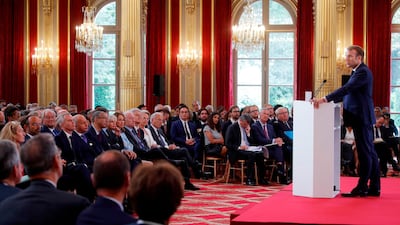French president Emmanuel Macron has urged Europe to stop relying on the United States for military defence and called for a fresh, integrated EU approach to prevent the bloc from falling apart.
Mr Macron said he would put forward new proposals in the coming months for the EU to boost defence cooperation, as well as talks with Russia on their security relationship. Eastern European countries have become increasingly nervy over the apparent Russian willingness to interfere around the globe and particularly in bordering states.
"Europe can no longer rely on the United States for its security. It is up to us to guarantee European security," Mr Macron told an audience of some 250 diplomats, lawmakers and international relations experts.
US president Donald Trump has repeatedly distanced himself from the NATO military alliance, which groups the United States with most of Europe and has underpinned European security since World War II.
German Foreign Minister Heiko Maas has made similar calls a for boosted military cooperation and Mr Macron's comments are likely to find support in EU powerhouse.
Writing in the Handelsblatt newspaper, Maas called for Europe to "take an equal share of the responsibility" and "form a counterweight" to Washington as Europe-US relations cool.
France and Germany have both backed the idea of a small joint European response force over the last year, and have announced plans to develop a fighter jet together.
Mr Macron came to power last year vowing to overhaul the EU and has pushed for deep political reforms — including a separate budget for the eurozone — which have so far met with lukewarm support.
His agenda has been hit by the rise of a new eurosceptic and nationalist government in Italy, as well as resistance from rightwing leaders in Poland and Hungary.
He admitted that "France seems sometimes to be on a solitary path".
_______________
Read more:
Macron targets French welfare spending as deficit pressure rises
_______________
But Mr Macron lashed out at the rising tide of nationalism and called for countries to heal divisions which have widened over how to tackle the ongoing influx of migrants in particular.
"France wants a Europe which protects, even as extremism has grown stronger and nationalism has awoken," he said.
"Divisions between north and south over economics, between east and west on migration, too often fracture our European Union," he added, urging a "humanist" approach to the changes brought by globalisation.
As for the solution, he insisted his approach would be to "give up nothing of the ambitions set out a year ago" when he came to office, which would mean creating a more integrated European Union with greater strategic autonomy.
"Do China and the United States think of Europe as a power with similar independence to their own? It is not the case," he said.
He also took at a swipe at ruling populists in Hungary and Italy, drily noting that their anti-EU rhetoric seemed to vanish when it came to accepting economic development aid from the EU.
"There is a clear approach of European opportunism while claiming to be nationalist," he said, calling out Hungary's Viktor Orban by name.
He did, however, acknowledge that a lack of European solidarity had played a role in prompting bitter disputes in recent months with Italy over migration.
"But does that excuse xenophobic comments?" he added in what appeared to be a veiled jab at Italy's far-right League.
"I don't think so, and I think these xenophobes bring no solutions to the problem they complain of."
In a typically expansive overview of his foreign policy, MR Macron called for Europe to build "strategic partnerships" with neighbours Turkey and Russia despite their differences.
Britain will also be in line for a "strategic partnership" after its departure from the EU scheduled next year — but Mr Macron warned that Brexit must not come at the cost of the unity of the rest of the EU.

